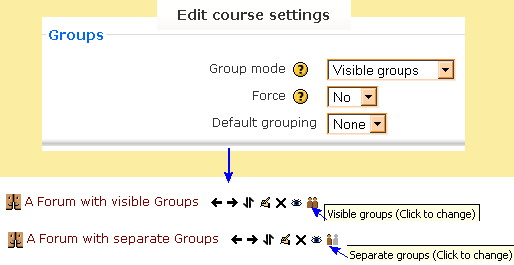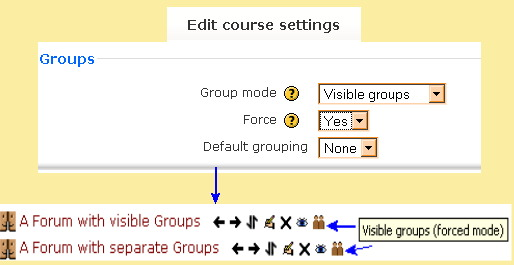Groups course settings
Template:Course admin Enabling Groups will allow the teacher to create sets of students. By default, the groups settings are turned off in a course. Groups can be used in the Context of a course or in a specific course activity.
Most of this information is also repeated in the Course settings page under Groups and on the Groups page.
Group mode
This settings defines the default group mode for all activities in the course, by a pull down menu. The group setting can affect what users see in the course Participants list. There are 3 group mode choices: Visible, Separate and No groups.
- TIP: When force mode is set to no, group mode merely acts as a default setting for each new activity. However, when force mode is set to yes, then the course group mode overrides all activity group settings. There are some examples of the two force settings below.
- The course group mode is useful when the teacher is going to add several activities with the same group setting. In a course with many activities that have different group mode settings, a teacher might enter them in batches, using the group course setting to save time.
Visible groups
Each group works in their own group, but can also see other groups. The other groups' work is read-only.
- The above example shows the group section in the course settings and part of a course. The teacher wants the default activity group setting to be "visible" but has not "forced" this preference on all activities. This is show by the two forum activities, where one shows the visible group icon and the other the separate group icon.
Separate groups
Each group can only see their own group, others are invisible.
No groups
There are no sub groups, everyone is part of one big community. They can see other peoples activity and interact with them.
Force
A "force" group mode at the course-level, will override any individual activity "group mode" setting, with the one set in the course.
- In the course example show above in "group mode" we had two activities, one set for visible group mode and the other set for separate group and the course Force was set to "No". In the example below, the teacher changed the settings in the same course. The teacher put the course settings on visible group mode and said "yes" to the Force mode.
[[Image:
- TIP:The force setting is useful when the teacher wants to import activities from another course and not have to change each activities group settings.
Default grouping
Allows the teacher to set a default group.
- TIP: To see other groups in this list, you will have to go to the Course administration>Groups tab and use the Auto-create groups button. One you set the auto create fields, then a group will appear under this heading in addition to "Default".
Using groups in course or activity
A group or grouping can be used on two levels:
- Course level - the group mode defined at the course level is the default mode for all activities defined within that course. Changing the force mode to yes, will override any individual activity group mode settings.
- Activity level - each activity that supports groups can also have its own group mode defined. The course setting under Groups must have "Force" set to "No" to allow individual activities to allow their own group settings to work.
Tips and Tricks
- Groups icon not showing? - remember to select something other than "none" in the Group mode.
See Also
- Groups for more information about how to setup and use this feature.
- Groups FAQ for some usual questions and answers about Groups

